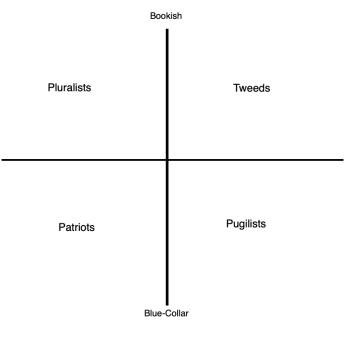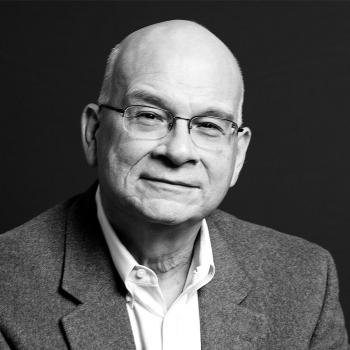 When I was a teenager, I enthusiastically attended programs like Worldview Academy and Summit Ministries (and am still broadly supportive of their work). But over the years, I’ve realized that “worldview”—the backbone concept of such programs—is a term that doesn’t show up much in my writing anymore, even though it’s positively ubiquitous in educated Protestant spaces. (Following Alasdair MacIntyre, I prefer “tradition,” which I think gets at the general underlying idea while reflecting a sense of rootedness.)
When I was a teenager, I enthusiastically attended programs like Worldview Academy and Summit Ministries (and am still broadly supportive of their work). But over the years, I’ve realized that “worldview”—the backbone concept of such programs—is a term that doesn’t show up much in my writing anymore, even though it’s positively ubiquitous in educated Protestant spaces. (Following Alasdair MacIntyre, I prefer “tradition,” which I think gets at the general underlying idea while reflecting a sense of rootedness.)
At the risk of oversimplifying, the evangelical concept of “worldview” refers to a comprehensive system of beliefs about the world that follows from certain foundational axioms. Or, put another way, the “inner logic” of those axioms leads to convictions about (as Summit breaks it down) theology, philosophy, biology, psychology, ethics, sociology, law, politics, economics, and history.
Though it took me a few more years than it should’ve to realize it, this evangelical concept of worldview has more than a passing similarity to presuppositionalism, a distinctively Reformed approach to epistemology often associated with the work of Cornelius Van Til. On the presuppositionalist view, the “noetic effects of sin” have so damaged human reasoning faculties that they cannot be trusted to give reliable information about the world. Only the Bible—the revealed Word of God—can serve as the proper foundation of intellectual inquiry.
I’m sympathetic to the presuppositionalist reflex, which emerges from the (correct) intuition that there is no intellectual “view from nowhere”: all knowledge we encounter is inevitably modulated through a grid of background beliefs, through our unique personal histories, and so on. That being said, in placing the epistemological accent so strongly on the Bible over against God’s “general revelation” in the created order, Reformed-style presuppositionalism suffers from a degree of hermeneutical naivete. Surely, just as one never approaches the world without presuppositions, one never approaches a text without presuppositions.
Moreover, presuppositionalism risks endorsing a kind of fatalism about the possibility of meaningful engagement with those outside one’s faith community. If there is truly no shared ground at all, Christians and non-Christians are reduced to merely talking past each other. The standard Van Tillian response to this charge would be that apologetics is primarily a matter of drawing out and exposing the latent contradictions within other philosophical perspectives—but notably, this does not leave the Christian with many intellectual resources with which to develop his own tradition.
Thinking in terms of “worldviews” is a natural development of the presuppositionalist impulse—rival worldviews, in all their pluriform detail, naturally emerge from rival presuppositions. And on that basis, worldview-centric thinking tends to assume a kind of doxastic determinism: if you hold [X] belief, you must also logically hold [Y] belief.
But that determinism simply doesn’t stand up to real-world scrutiny. What, for example, does “Christian economics” look like? If you’d asked me that ten years ago, you’d get a different answer than if you asked me today. That’s because I’ve lived longer and tested my beliefs against reality, and I’ve learned more about what Christianity has historically taught about economics. But this kind of shift is difficult for the “worldview model” to account for. My foundational belief—that the Bible is the Word of God—has not changed. My (quite conservative) hermeneutics have not changed. So in theory, shouldn’t my Christian worldview, as it pertains to economics, be precisely the same as it was? The underlying presuppositionalist idea is a little threadbare when it comes to analyzing how intellectual journeys unfold within a particular worldview.
In a similar vein, I am not at all a proponent of critical theory and its rejection of tradition tout court (as should be abundantly clear from anyone who browses this page’s archives), but I also find the overwhelming majority of attempts to hunt down “wokeness” within Christian circles to be annoying and intellectually shallow. Here’s why: nobody’s worldview is a perfectly airtight intellectual system. One will always encounter new ideas and influences that emerge from unfamiliar traditions of thought—some of which will be rejected, and some of which will be interpreted in ways consistent with one’s bedrock priors. For most of us, it’s obvious that just because a pastor happens to mention systemic racism doesn’t mean that they’re a closeted revolutionary who wants to deconstruct the Bible and burn down police stations. But when one is thinking primarily in terms of iron-walled rival worldviews, in which [Y] belief always reflects [X] conviction, anyone who tips their hand and uses a “Cultural Marxist” code-word must be an enemy, a wolf in sheep’s clothing.
This is a recipe for institution-destroying paranoia and mistrust. Frankly, it seems obvious to me that when confronted with statements that seem inconsistent with the speaker’s stated foundational beliefs, the right question to ask is not how did we ever trust you, but what exactly do you mean by that? But that’s not good enough for today’s “discernment bloggers” or “watchdogs.” (For what it’s worth, one could probably write a long essay breaking down this particular permutation of “worldview” thinking as a Protestantized expression of what Carl Schmitt called the “friend-enemy distinction,” the alleged first principle of politics.)
I’m still a believer in Summit’s project of examining the fundamental interconnectedness of ideas, which isn’t always obvious to teenagers. I wouldn’t trade those teenage experiences for anything. That said, though, it seems to me that in order to remain explanatorily useful, the worldview concept needs to acknowledge a certain degree of porosity to outside influence, the internalization of which doesn’t necessarily trigger the collapse of the whole system. How individuals’ views evolve within worldviews is an interesting question that hasn’t, as yet, gotten enough attention.
At the end of the day, though, to the extent that the idea of “worldview” comes to serve as Protestant shorthand for MacIntyre’s “tradition,” count me in. And I think that shift is quite possible—perhaps even likely.












